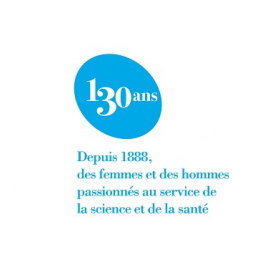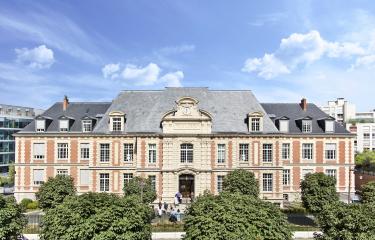Christine Petit, Professor at the Institut Pasteur and Professor at the Collège de France, received the 2018 Kavli Prize for Neuroscience from the Norwegian Academy of Science and Letters, for her pioneering work on the molecular and neural mechanisms of hearing. During her career, her scientific discoveries have earned her a great many international awards. As the Institut Pasteur is celebrating its 130th anniversary this year – November 14, 2018 – let's look back at Professor Christine Petit's discoveries which also led to her appointment as member of the National Academy of Inventors in the US in 2017.
The Institut Pasteur, a member institution of the US National Academy of Inventors (NAI) since 2015, was keen to celebrate the curiosity, creativity, innovation and invention that embody its rich heritage. So on June 27, 2017, it recognized the achievements of 14 of its inventors, who have been selected as members of the NAI. The event was perfectly in tune with the pioneering spirit of Louis Pasteur and the ensuing generations of Institut Pasteur scientists. The research of these 14 scientists has given rise to several US patents involving licenses, generating a positive impact for the Institut Pasteur and for society as a whole.
Professor Christine Petit was the first to decode the molecular physiology of the auditory system, based on the identification of genes responsible for early forms of deafness in humans. She has determined the pathogenesis of many types of deafness. Based on this knowledge, she and her team now develop curative therapies for hearing impairments. It is this fundamental transformation of knowledge of the auditory system and its impairments that have earned her a great many international awards throughout her career.

From bacterial genetics to hearing
Christine Petit joined the Institut Pasteur as a researcher in the mid-1970s and began working in the field of bacterial genetics in François Jacob's laboratory before moving on to immunology, genetics of cell differentiation and finally human genetics. When the genomic revolution began, Christine Petit saw a way of using genetic means to shed light on how sensory systems develop and function at cellular and molecular level. She therefore isolated the first gene responsible for an olfactory disorder – Kallmann Syndrome – then the first one responsible for a syndrome combining congenital deafness and vision loss, Usher syndrome. The auditory system, which does not lend itself to molecular analysis given its small number of cells, therefore became accessible thanks to the identification of genes that, when defective, are responsible for hearing loss. Several dozen laboratories across the world then followed her lead. The interdisciplinary approach, which Christine Petit then implemented with her team to understand the role of proteins coded by these genes, even revealed the role of some structures of the auditory system and of the molecular networks underpinning sound processing in the auditory sensory organ and, more recently, in the auditory cortex. At the same time, light was shed on mechanisms whose defectiveness leads to hearing impairments.
Genetic analysis of hereditary deafness
In the early 1990s, gaps in knowledge of the molecular physiology of hearing were attributed to the small number of cells in the cochlea, the auditory sensory organ. There are only 3,000 to 4,000 inner hair cells – true sensory cells – in humans. They could not be characterized at molecular level using the standard biochemistry and molecular biology approaches. Christine Petit saw an approach via genetic means as very promising. She therefore overcame issues that, until that point, had hindered genetic analysis of hereditary deafness, an essential step in identifying these genes. By studying hearing-impaired consanguine families living in geographical isolates in Tunisia, Lebanon, Jordan, Iran and Algeria (thanks to partnerships established with geneticists in these countries), she successfully localized the first two genes responsible for profound congenital hearing loss in human chromosomes. When defective, the gene coding for connexin 26 alone accounts for nearly half of cases of severe or profound congenital hearing loss in certain countries. At the Institut Pasteur, she discovered several dozen genes responsible for isolated deafness or deafness associated with other impairments. These genes are responsible for the most common forms of deafness, and mainly congenital forms. They include the gene coding for stereocilin, which is responsible for the most common form of moderate to severe congenital hearing loss. Thanks to the identification of these genes, molecular diagnosis of deafness has gradually become available to those with hearing difficulties in many countries.
From research into the auditory system to treatment
A period of unprecedented progress in knowledge of the normal and pathological auditory system then followed. With her team, Professor Petit discovered numerous mechanisms that underpin sound processing in the cochlea and she also classified deafness types based on their pathogenesis. The interdisciplinary approach conducted with Paul Avan from the University of Auvergne was particularly fruitful. By focusing her research on sensory cells and especially the structures that give them their specific functional aspects – their bouquets of apical protrusions that respond to sound stimulation, their cell junctions continually solicited by mechanical sound stimulation, and their synapse with remarkable physiological properties – their function and malfunction could be explained by molecular means. From then on, therapeutic possibilities were explored, with a particular focus on gene therapy. This is, in fact, the aim of the research she is conducting with her team at the Institut Pasteur today (see the recent press release on Usher syndrome: gene therapy restores hearing and balance).
Recognition of a great scientist
For all these reasons, Christine Petit was awarded the 2018 Kavli Prize for Neuroscience from the Norwegian Academy of Science and Letters (press release in French), for her pioneering work on the molecular and neural mechanisms of hearing. Since May 2018, she has also been head of the scientific advisory board at Sensorion, a French biotech company that develops treatment for inner ear disorders. She received the Inventor Award from the Institut Pasteur in 2017 and was appointed member of the National Academy of Inventors in the US on receiving this award.
Christine Petit is Professor at the Collège de France, holder of the Chair in Genetics and Cell Physiology, and Professor at the Institut Pasteur. She also directs the Genetics & Physiology of Hearing Unit at the Institut Pasteur, affiliated with Inserm (UMRS 1120) and Sorbonne University.
Professor Petit's scientific discoveries have earned her a great many prestigious awards, including the ARO Award of Merit (Association for Research in Otolaryngology, USA) for all her research work, the Hugh Knowles Prize (USA) for her outstanding contribution to knowledge of the auditory system, the Louis-Jeantet Prize for Medicine (Europe), the international Brain Prize awarded by the Grete Lundbeck Foundation, the L’Oréal-UNESCO Award for Women in Science (Europe), and the INSERM "Grand Prix" (France). She is a member of the French Academy of Sciences, and the National Academy of Sciences and National Academy of Medicine in the US.
Professor Christine Petit will direct the Hearing Institute and center for research and innovation in human audiology, due to open in Paris in early 2019. It aims to help advance knowledge in auditory neuroscience and develop new diagnostic and therapeutic approaches.










